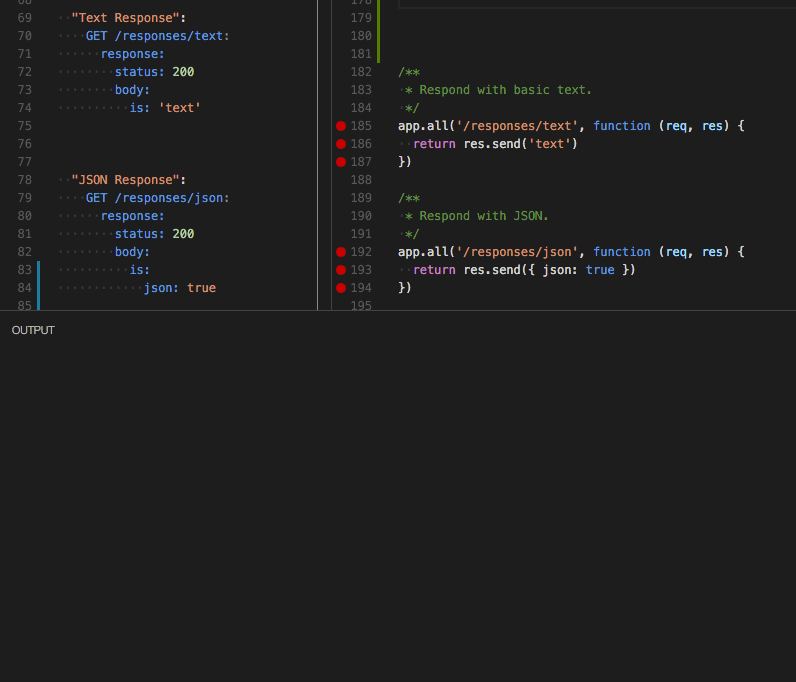http-bat
v2.0.30
Published
[![HTTP-BAT][logo-url]][repo-url] # Http Blackbox API Tester (`http-bat`) [![NPM version][npm-image]][npm-url] [![NPM downloads][downloads-image]][npm-url] [![Build status][travis-image]][travis-url] [![Test coverage][coveralls-image]][coveralls-url]
Downloads
1,896
Readme
Http Blackbox API Tester (http-bat)
Describe your platform independient API tests using ATL (Api Testing Language) and run them using http-bat. It also generates coverage reports for your RAML files.
Usage
Install
Install the tool executing npm install -g http-bat
Using command line, useful for CI
Run your tests on api folder:
$ http-bat api/*.spec.ymlRun your tests with a custom remote URI:
$ http-bat github_api/*.spec.yml --uri http://api.github.comYou need it embeded on a Node project? (Useful for coverage and CI)
Install the package
$ npm install http-bat --save-dev
test/api.spec.js<- mocha spec
import { GenericAdapter } from 'http-bat/dist/adapters'
require('http-bat/dist/adapters/mocha')
// Mocha detection should be automatic. But since mocha and node changes a lot, this line may be required.
GenericAdapter.runFile('file.yaml')Execute mocha on your project
$ mocha
Current features
You can read the entire list on this page
VSCode extension
Examples
Wiki examples
- Full CRUD
- Obtain and use access tokens
- Travis CI for APIs
- Travis CI for APIs (With RAML coverage)
- Using environment variables, e.g. storing credentials.
Test response status code
#%ATL 1.0
tests:
"Favicon must exists":
GET /favicon.ico:
response:
status: 200
"Should return 401":
GET /unauthorized_url:
response:
status: 401
"Should return 404":
GET /asjdnasjdnkasf:
response:
status: 404Send query string parameters
#%ATL 1.0
tests:
"Inline query string":
GET /orders?page=10:
response:
status: 200
"Non inline":
GET /orders:
queryParameters:
page: 10
response:
status: 200
"Override inline query string":
# The final url will be /orders?page=10&qty=20
GET /orders?page={----asd---}&qty=20:
queryParameters:
page: 10
response:
status: 200Validate response ´Content-Type´
#%ATL 1.0
tests:
"Must return text":
GET /responses/text:
response:
content-type: text/plain
"Must return json":
GET /responses/json:
response:
content-type: application/json
"Must return url-encoded":
GET /responses/url-encoded:
response:
content-type: application/x-www-form-urlencodedSend headers
#%ATL 1.0
tests:
"Headers":
GET /profile#UNAUTHORIZED:
response:
status: 401
GET /profile:
headers:
Authorization: Bearer asfgsgh-fasdddss
response:
status: 200 Validate response headers
#%ATL 1.0
tests:
"Headers":
PUT /bounce/headers:
response:
headers:
Access-Control-Allow-Headers: "Authorization, X-Default-Header, X-Custom-Header" # literal valueValidate response content
#%ATL 1.0
tests:
"Must validate response body":
GET /text:
response:
body:
content-type: text/plain
is: "Success"
# "is" means equals. In this case the response is the text "Success"
GET /json:
response:
body:
content-type: application/json
is: !!map { json: true }
# "is" means equals. In this case the response is the JSON {"json":true}
GET /json/v1:
response:
body:
content-type: application/json
is:
json: true
# "is" means equals. In this case the response is the JSON {"json":true}
# this is the same as the previous exampleValidate response (partially)
#%ATL 1.0
tests:
"Must validate response body":
GET /json:
response:
body:
content-type: application/json
# In this case the response is the JSON { "json":true, "a": 1, "b": 2 }
matches:
- a: 1
# "json" and "b" properties will be ignored
GET /users:
response:
body:
content-type: application/json
# In this case the response is the JSON
# [
# { "id": 1, "name": "Agu" },
# { "id": 2, "name": "Dan" }
# ]
matches:
- "[0].id": 1
- "[1].name": DanExecute in sequence. Obtain access token
#%ATL 1.0
variables: # anything can be stored here
oauth:
accessToken: "INVALID_TOKEN"
tests:
"Access control by token, executed in sequence":
GET /secured_by_token#should-be-unauthorized:
description: Must be unauthorized
queryParameters:
accessToken: !!variable oauth.accessToken
response:
status: 401
POST /get_access_token:
# the server responds { new_token: "asd" }
description: Obtain access token
response:
body:
take: # take "new_token" from response body
- new_token: !!variable oauth.accessToken
GET /secured_by_token:
description: Now the status must be 200 OK
queryParameters:
# use the access token obtained previously
accessToken: !!variable oauth.accessToken
response:
status: 200
body:
is:
success: trueCRUD
This example shows how to create an asset, check that it exists, put new content on it and delete it. Then check 404 for the same asset.
Also shows how use ENVIRONMENTS variables. ENV variables are stored on variables.ENV, can be accessed using!!variable ENV.*
#%ATL 1.0
variables:
ENV:
csToken: Bearer <<YOU MUST DEFINE YOUR csToken ON ENV>>
organizationId: abc123
flow:
id: ""
tests:
"Project create and delete":
POST /organizations/{orgId}/projects#create'first:
description: Create project
uriParameters:
orgId: !!variable ENV.organizationId
headers:
Authorization: !!variable ENV.csToken
request:
json:
name: RetrieveEmployeeFlow,
created: 06-06-06
updated: 06-06-06
environmentId: asd1f65dasf656
organizationId: !!variable ENV.organizationId
response:
status: 201
body:
# store the whole response (project) in projectNuevo
take: !!variable projectNuevo
GET /organizations/{orgId}/projects/{projectId}:
description: Check that the created project exists
uriParameters:
orgId: !!variable ENV.organizationId
projectId: !!variable projectNuevo.id
headers:
Authorization: !!variable ENV.csToken
response:
status: 200
body:
matches:
- id: !!variable projectNuevo.id
PUT /organizations/{orgId}/projects/{projectId}:
uriParameters:
orgId: !!variable ENV.organizationId
projectId: !!variable projectNuevo.id
headers:
Authorization: !!variable ENV.csToken
request:
json: !!variable projectNuevo
response:
status: 200
body:
matches:
id: !!variable projectNuevo.id
DELETE /organizations/{orgId}/projects/{projectId}:
uriParameters:
orgId: !!variable ENV.organizationId
projectId: !!variable projectNuevo.id
headers:
Authorization: !!variable ENV.csToken
response:
status: 200
GET /organizations/{orgId}/projects/{projectId}#mustn't exists:
uriParameters:
orgId: !!variable ENV.organizationId
projectId: !!variable projectNuevo.id
headers:
Authorization: !!variable ENV.csToken
response:
status: 404



